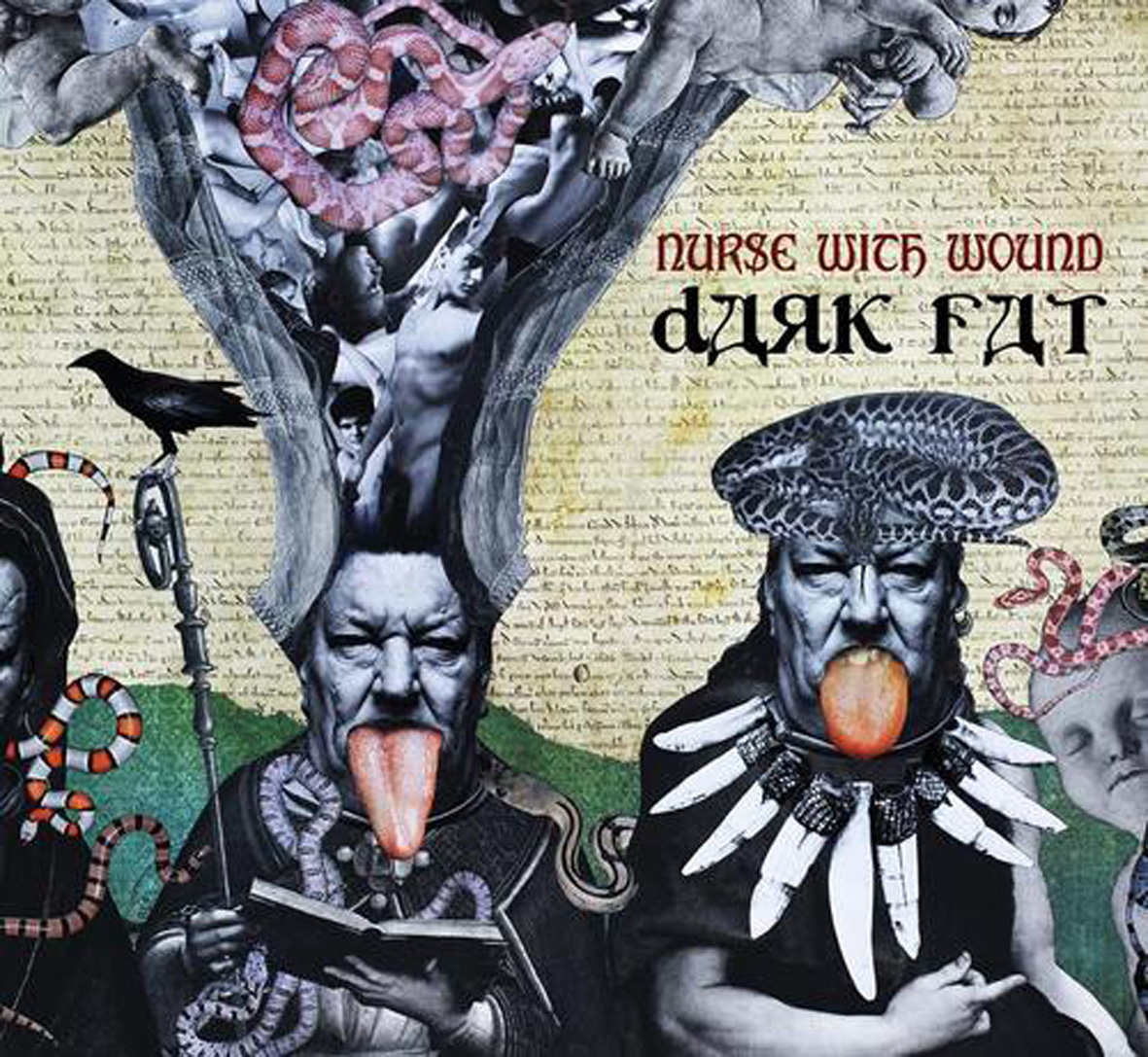
I gave up trying to make sense of Nurse With Wound’s sprawling, self-cannibalistic, and absolutely inscrutable discography quite some time ago, but it definitely seems like it has been a very long time since Steven Stapleton has released anything that meets my not-particularly-stringent "this is an actual, legitimate new album" criteria (excellent Graham Bowers collaborations aside, of course).  Consequently, I was hoping Dark Fat would be the album to end NWW's long and perversely prolific silence (it was explicitly billed as "long-awaited," after all).  Alas, it is not exactly the bold new artistic statement that I was hoping for.  Instead, it is a sprawling collection of "live" recordings ranging from rehearsals to sound checks to actual gigs.  Despite its dubious hodge-podge origins, however, Dark Fat actually feels an awful lot like a studio album–quite a damn good one, even.  While longtime NWW fans will probably experience many flickers of recognition over the course of these two hours, Stapleton and his collaborators have so thoroughly reshaped and recontextualized everything that it all feels fresh, vibrant, inspired, and appropriately disorienting all over again.
The best way to summarize this album is to say that it feels like Steven Stapleton assembled an entire village-worth of like-minded artists for a very abstract and cavalier traipse through some of NWW’s greatest hits.  In a way, I suppose that is exactly what he did, but the twist is that it was a very fitful, slow-motion, and "revolving door" process that spanned six years.  In any case, aside from the core group of Stapleton, Colin Potter, Matt Waldron, and Andrew Liles, Dark Fat features a head-spinning roster of avant-garde luminaries in cameo roles ranging from Jacques Berrocal to Stephen O’Malley to James Blackshaw.  As if that were not enough, it also features some unwitting contributions from Klaus Schulze, Michael Schenker, and Cream’s Jack Bruce (if the roll call during the final untitled track is to be believed).  Clearly, even the deceased were clamoring to get in on this party.  Naturally, that deranged eclecticism extends to the instrumentation as well, covering everything from Hawaiian guitars to saxophones to cornets to smoke bombs.  Given all that, it is unsurprising that Dark Fat is a deliciously difficult album to wrap my head around, as it is massive, freewheeling, and kaleidoscopic in the extreme.
Lamentably, I do not have total recall of NWW's entire back catalog (does anyone?), so the only real "hit" that jumps out at me is "Rock’n Roll Station," which turns up twice in impressively mangled form.  On "Rock n Rolla 1959," the original groove is transformed by the addition of a laid-back bass line and a bizarre, stream-of-consciousness monologue from Jacques Berrocal.  Later, on the untitled album finale, the band reprises the song in more recognizable form, but stretches it out into a lazy 9-minute jam peppered with squalls of wah-wah guitar, hard rock shredding, stage banter, and bouts of extreme noise chaos.  If any one piece can be said to represent the entirety of Dark Fat in microcosmic form, it is undoubtedly that one, as a recurring theme throughout the album seems to be hallucinatory abstraction coupled with amusing nods to conventional rock tropes.  The lion’s share of the album, however, just feels like an amorphous and unpredictably evolving collage of everything NWW does best: ominous ambience, garbled vocal cut-ups, odd juxtapositions, snatches of old exotica records, and a host of electronic blurts and squiggles.  The sole significant exceptions are "Devil Dreamin’" and "Devil is this the Night," as Huffin’ Rag Blues vocalist Lynn Jackson returns for a satanic pair of blearily soulful noir-jazz numbers that actually feel like legitimate songs.  In addition to being the album’s finest moments, the Jackson pieces highlight yet another recurring theme that pervades this collection, which is inventively recalling the spirit of a previous NWW highlight rather than just explicitly reprising it.  Consequently, much of Dark Fat feels simultaneously new and familiar, like hearing some lost outtakes from a favorite album.
Naturally, a two-hour retrospective of soundchecks and rehearsals is going to have some faults, but Dark Fat actually has far fewer flaws than I would have expected.  The worst offenses are probably just that a few pieces overstay their welcome and that the band was definitely in a very self-indulgent mood at times.  Also, the variations on "Rock’n Roll Station" are not nearly as good as the original, though the intent was clearly aimed towards gleefully pulling it apart and détournement rather than something as banal as improvement.  A far more fascinating subject is how Stapleton inventively makes a virtue of Dark Fat’s flaws, as this seems like a totally phoned-in album on paper.  In reality, however, this eclectic, free-form grab-bag is actually one of the strongest NWW albums in recent memory.  It is not definitely not new for high art, low art, homage, surrealist lunacy, impish humor, and just general dicking around to all coexist on a Steven Stapleton album, but it rare for them all to do so quite this effectively and naturally.  Dark Fat is essentially an unexpectedly brilliant editing tour de force, masterfully distilling a large part of NWW’s bizarre and wide-ranging legacy into richly textured fever dream of an album.
 
Read More

